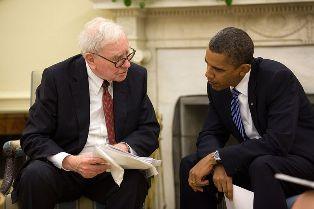With President Barack Obama facing re-election and the economy facing an all-too-familiar recession, Obama’s latest economic policy proposal, the “Buffett Rule” tax, has ignited a polarizing debate in an already divided Congress.
Named for billionaire investor Warren E. Buffett, this policy would create a baseline required tax rate for those with incomes over $1 million a year, according to White House administration officials.
“My friends and I have been coddled long enough by a billionaire-friendly Congress,” said Buffett to The New York Times. “It’s time for our government to get serious about shared sacrifice.”
This shared sacrifice, this equality between the classes in terms of taxes paid, indeed, remains Obama’s steadfast goal with his introduction of this new tax “rule,” as he calls it. After all, for decades now, it has been overwhelmingly common for millionaires to pay less of a tax percentage than those in income brackets below them.
“(This happens) mainly through tax deductions,” said Bob Williams, professor of economics. “For example, some people are getting tax deductions for multiple homes. There is a variety of things that wealthy people can get tax deductions for, some perfectly socially meritorious and others less so.”
Though the system Williams refers to has been criticized by many, controversy still resonates in congress over this invocation of tax rate adjustment.
Republicans largely argue that funds for deficit reduction should not be created through a millionaire minimum tax rate, but instead pulled from programs like Medicare, Medicaid, and Social Security, the New York Times reports.
“Tax increases, however, are not a viable option for the joint committee,” said Speaker John A. Boehner (R) from Ohio in a speech after the announcement of the policy proposal.
Boehner, who has reportedly insisted he will not vote for any new policies involving tax increases, is among those who believe that a solution to this economic recession lies chiefly in cuts on social programs. This position, however, has served as a political bargaining tool for Obama, as he urges Republicans to agree to tax increases, while promising support of cuts on Medicare and Medicaid.
This tactic challenges the Republican aversion to tax increases, one of the issues which has prohibited Congress from making much progress on economic policy.
“So much of the discussion is that this or that does a bad thing and that’s the end of the discussion,” said Williams, on the Congressional debate over tax increases. “That’s only half of the discussion. What are the good things that it does and how do you balance the two out?”
Still, some are accusing Obama of sparking a fiery “class warfare” with this millionaire minimum tax, according to Fox News.
“Class warfare may make for really good politics, but it makes for rotten economics,” said Rep. Paul D. Ryan (R) to Fox News.
Many have latched onto this sentiment, questioning whether this tax will truly level the playing field or only contribute to U.S. social stratification.
“I think we use the term ‘war’ way too freely,” said Maria Rosales, professor of political science. “We have social stratification in the U.S. and it’s getting worse … but there is actually research that shows people in general, including wealthy people, are happier in a society with more economic equality.”
Presumably, the Buffett Tax is aimed at creating more of just that.
Evidently, this tax rate adjustment is only fueling the fire of the congressional debate on economic policy, as well as generating numerous doubts and questions. Is Obama targeting a large enough group? Should he be targeting a group in the first place? Why must social program funds suffer? Is this the invocation of class warfare? And just how much will this affect the U.S. economy long-term?
All of these queries have been brought to the surface with Obama’s new economic proposal. Though perhaps it is these questions, along with emerging discussion over U.S. wealth distribution, that deserve the most attention.
“One of the important things about this tax is that it begins to look at the concentration of income in this country,” says Williams. “Not many people are talking about that. One of the underlying causes of the Great Depression was concentration of income among the wealthy. We’re above that.”

